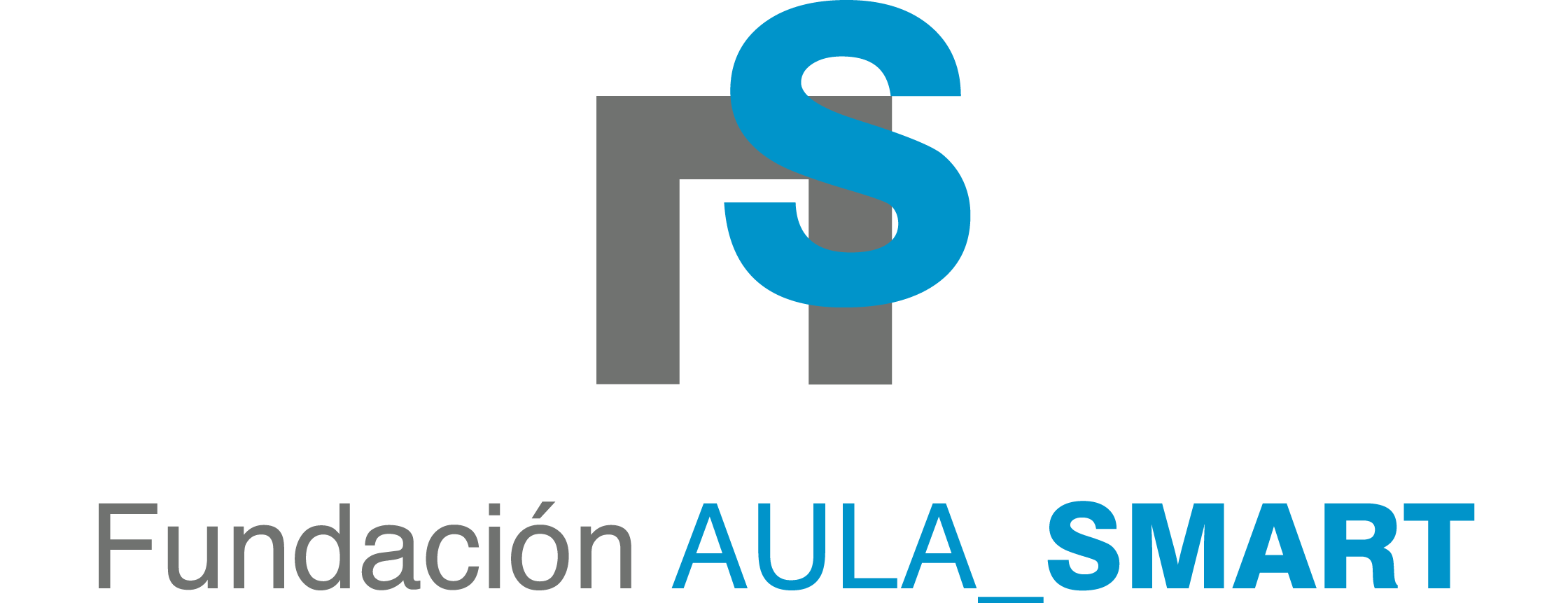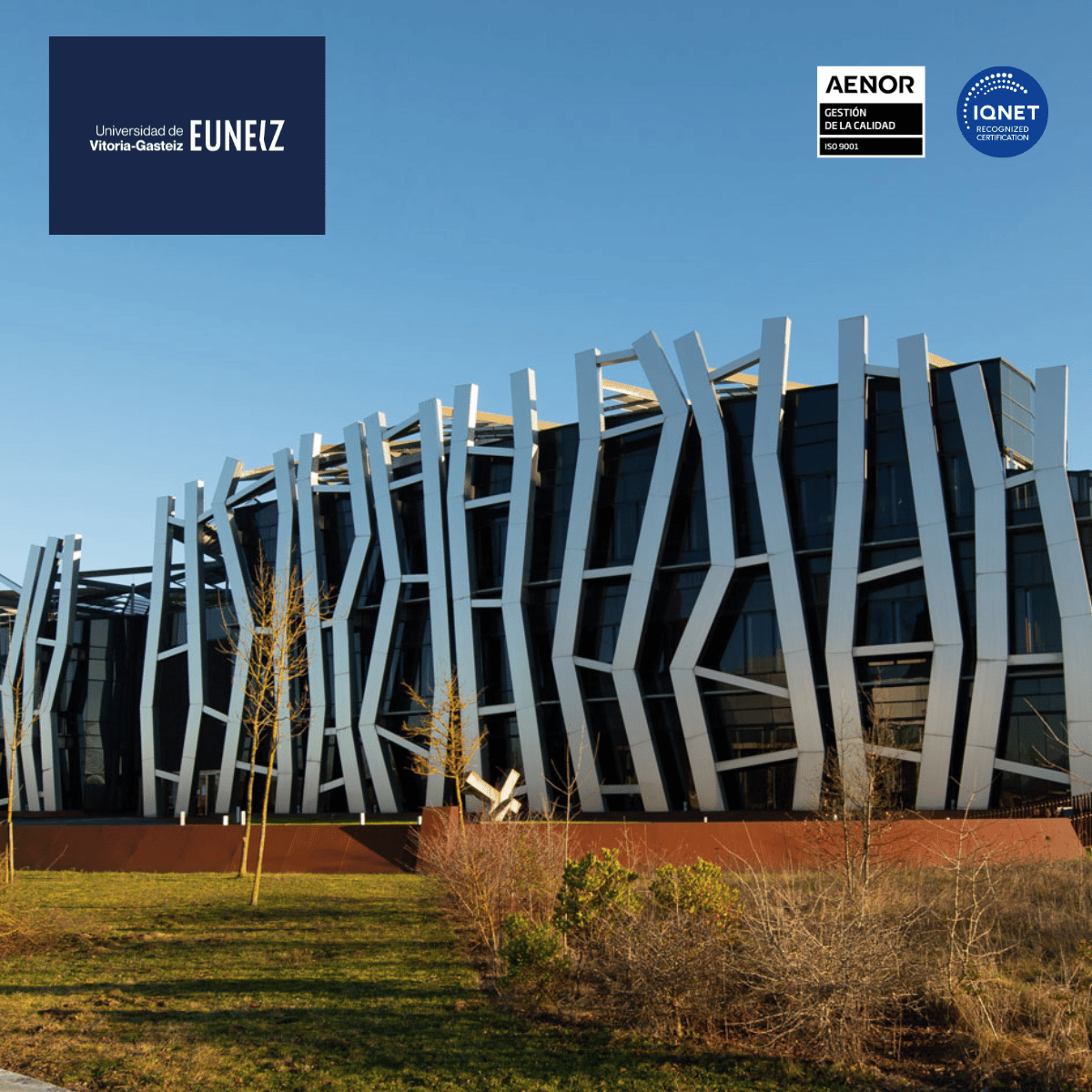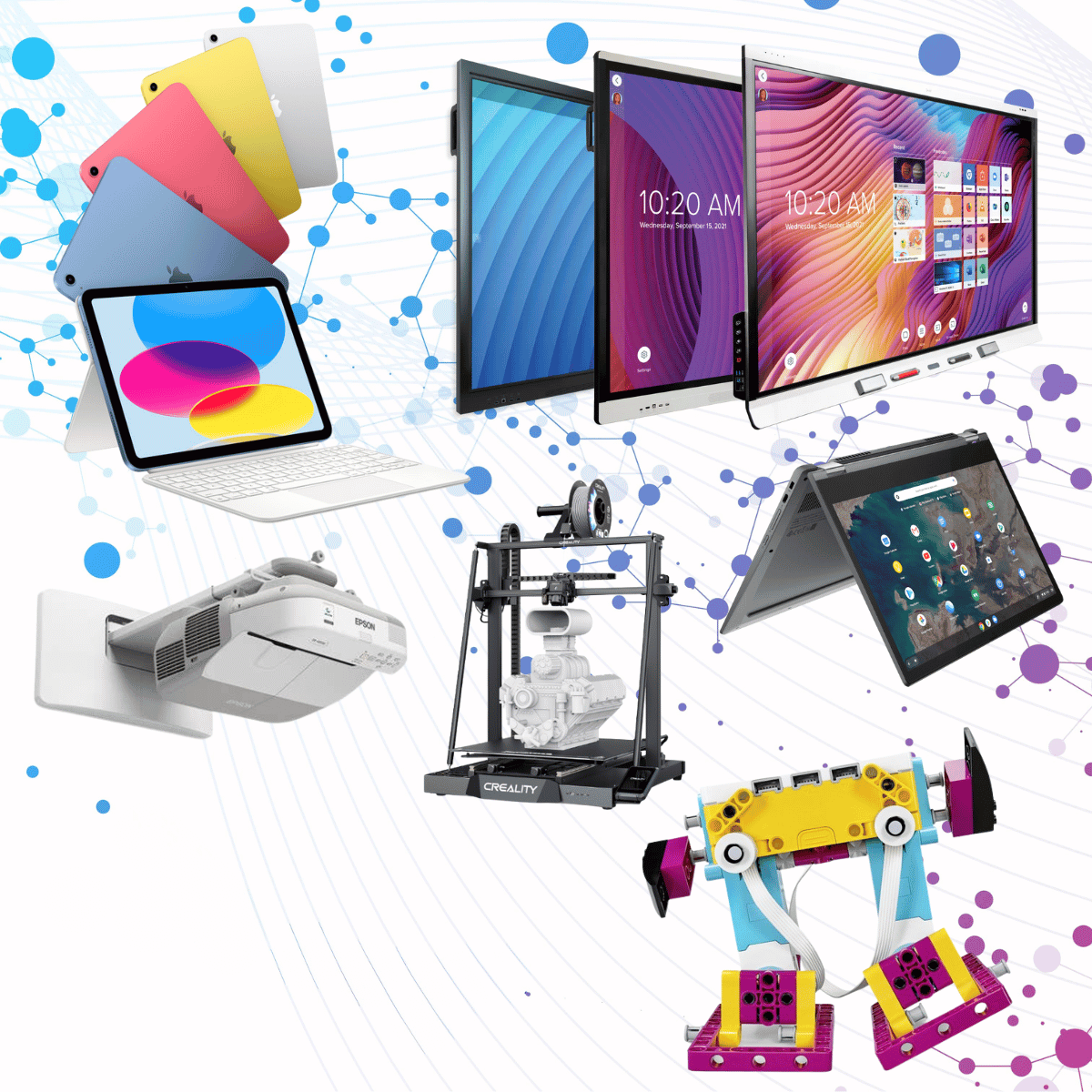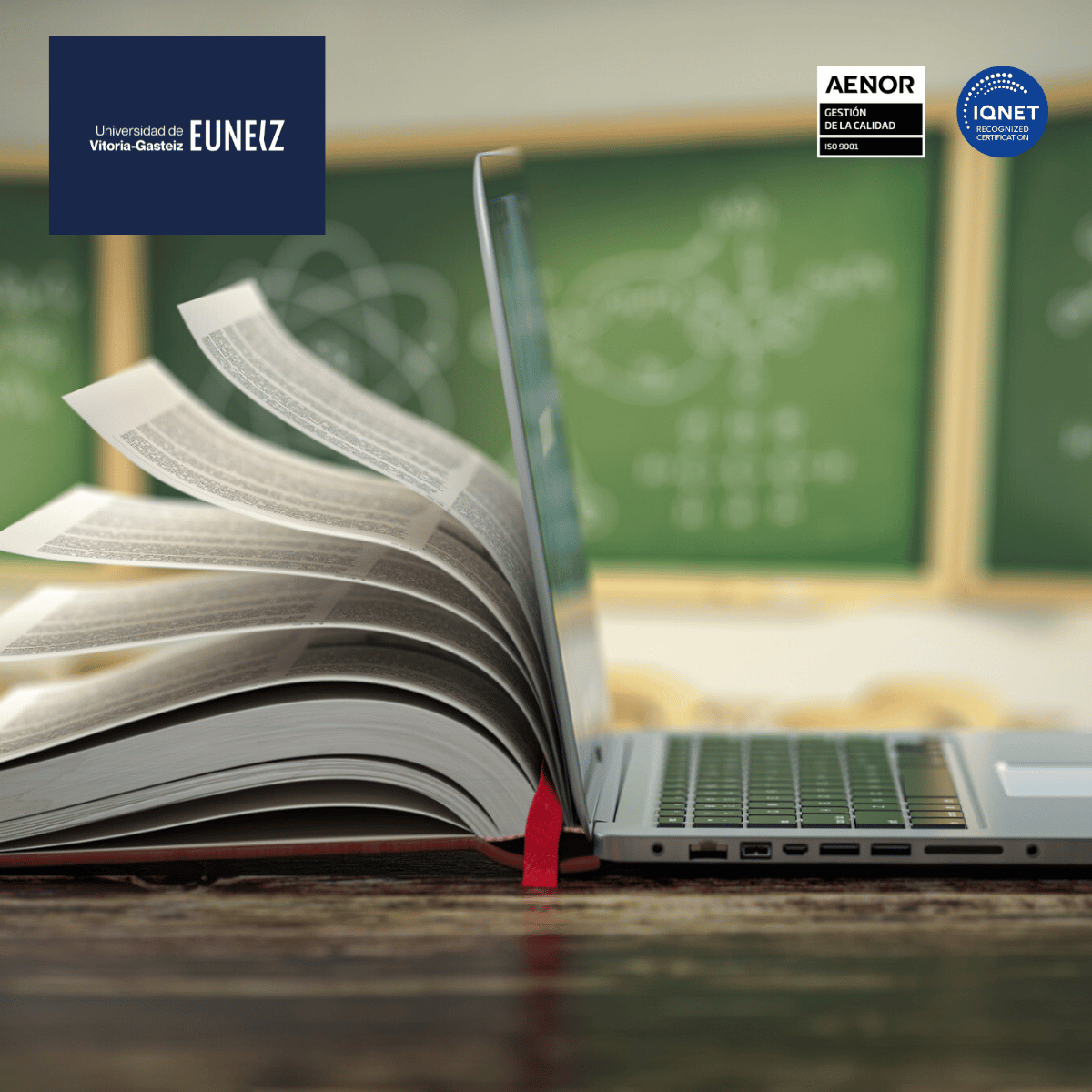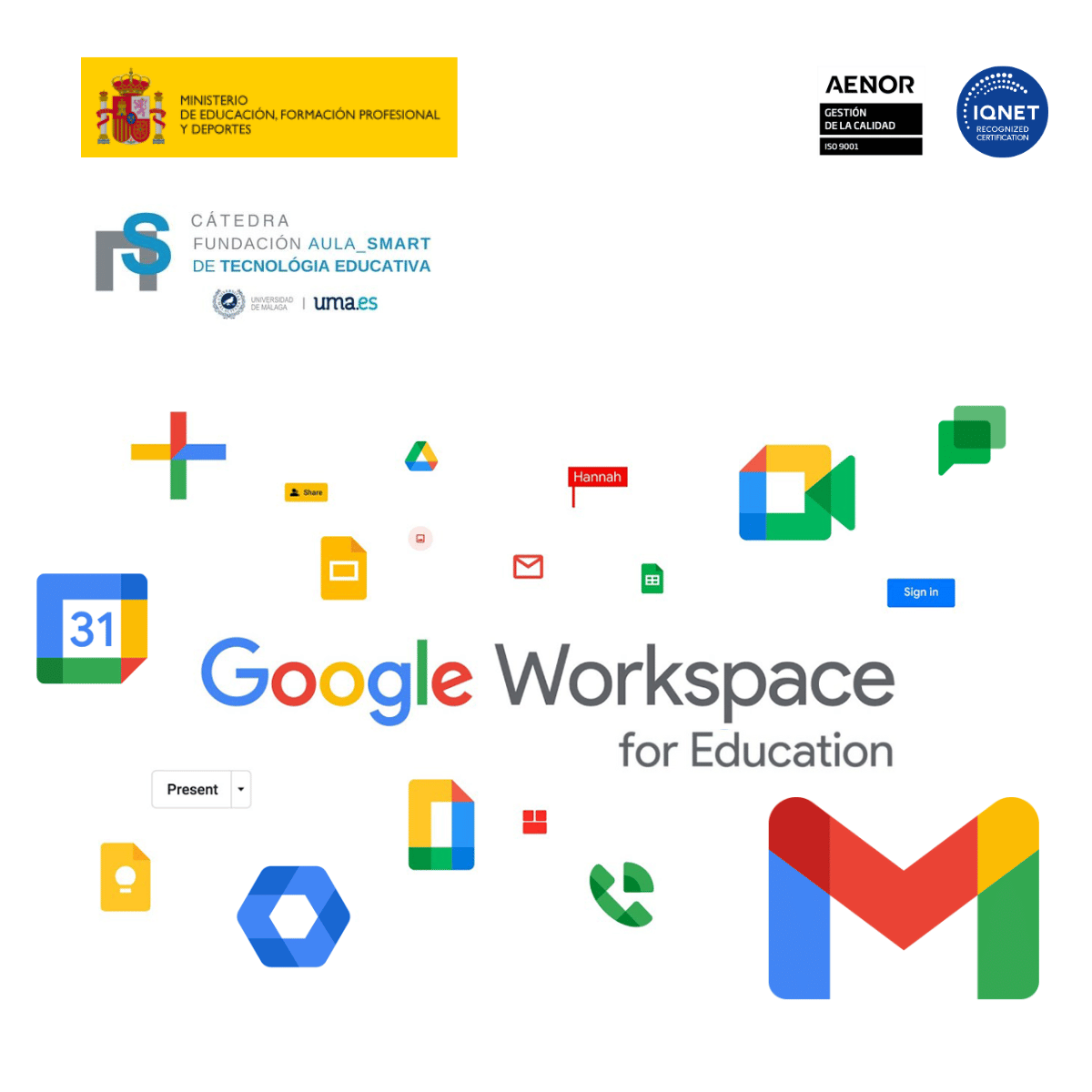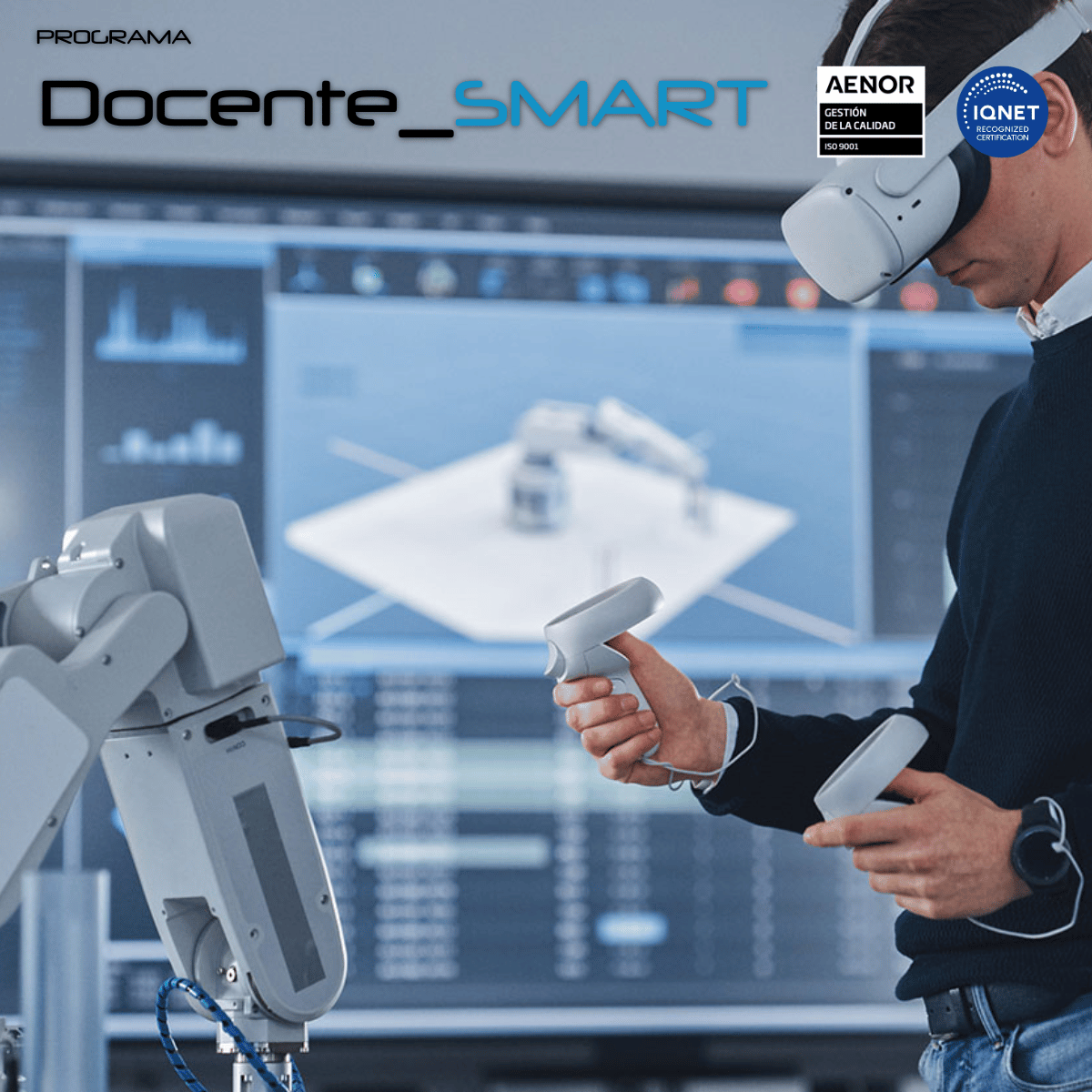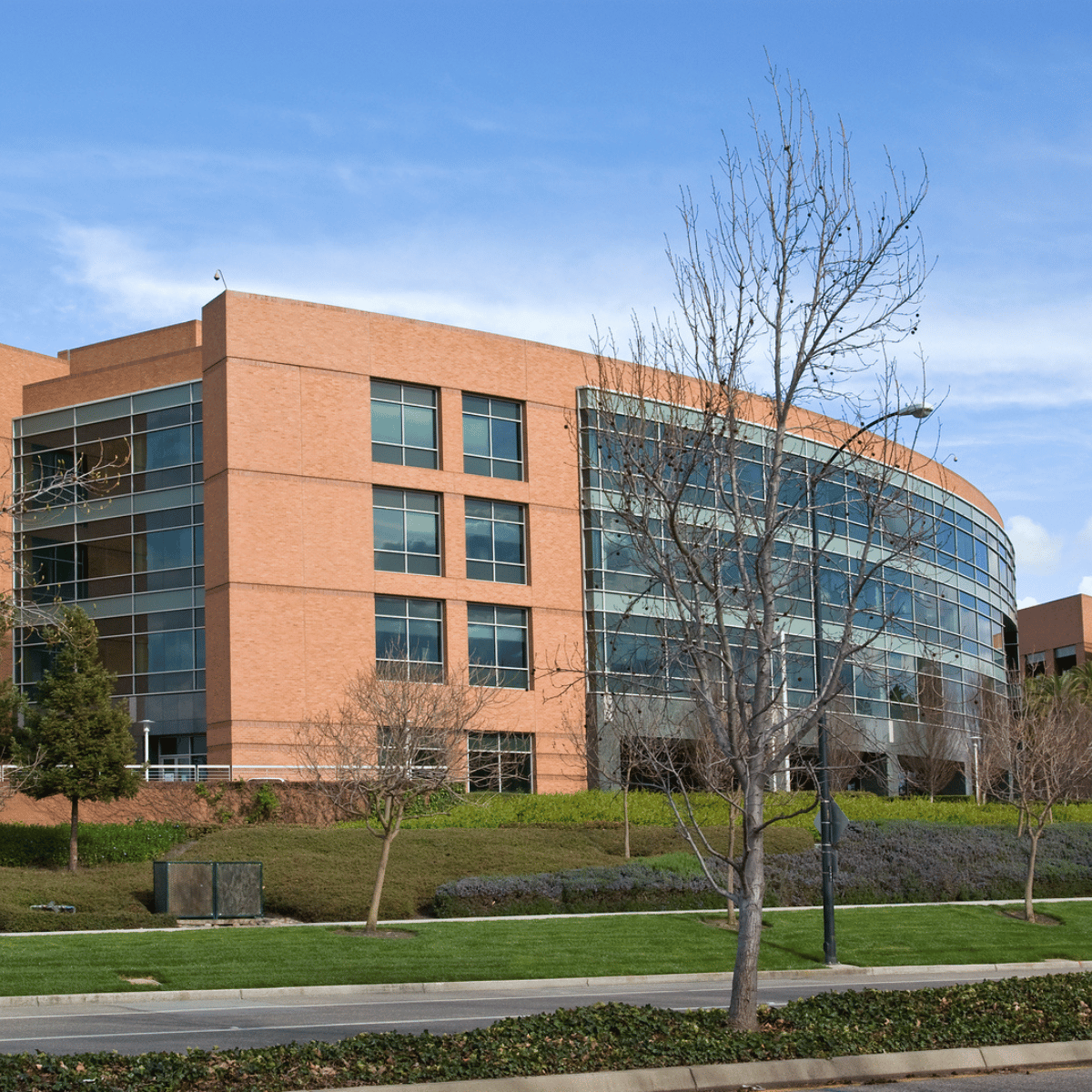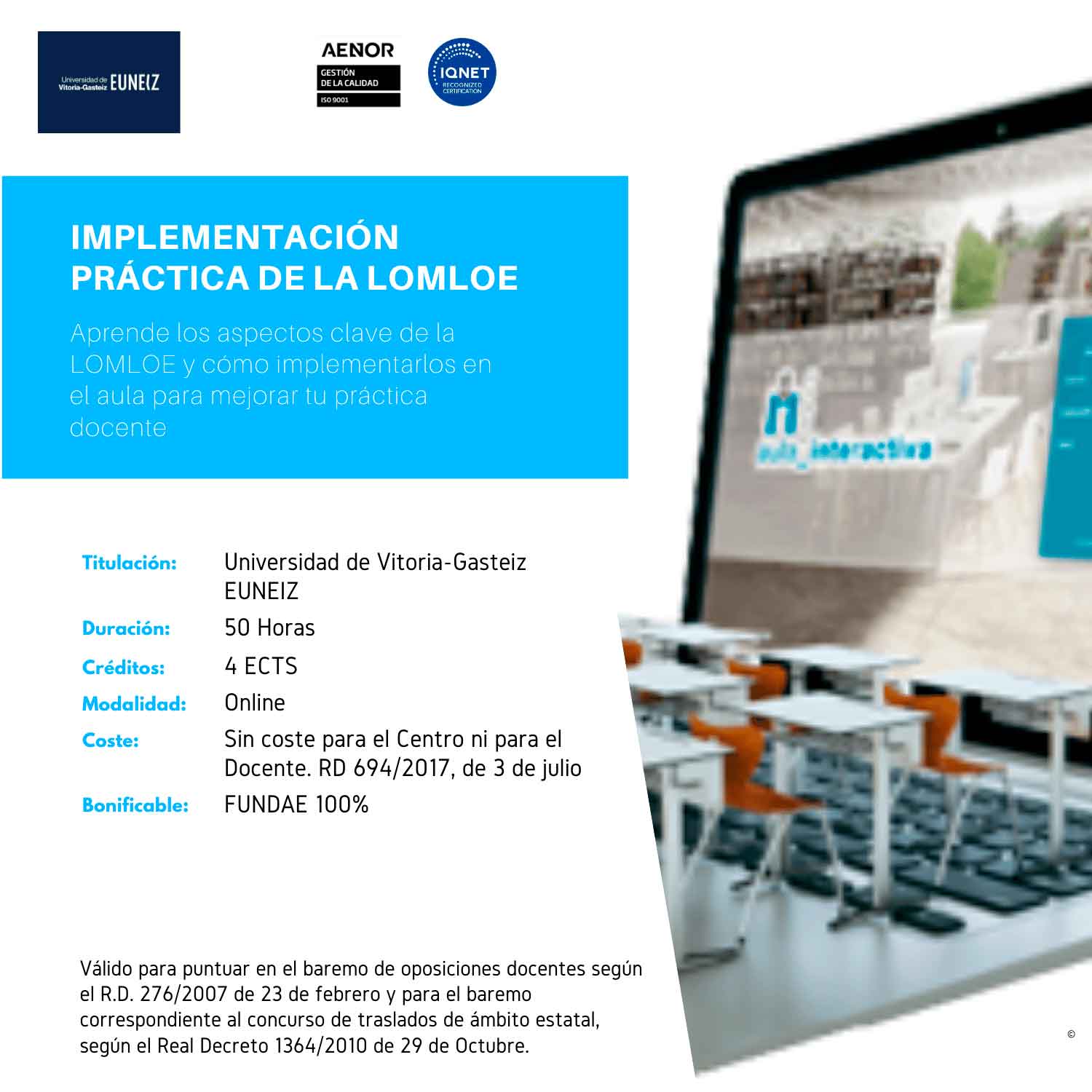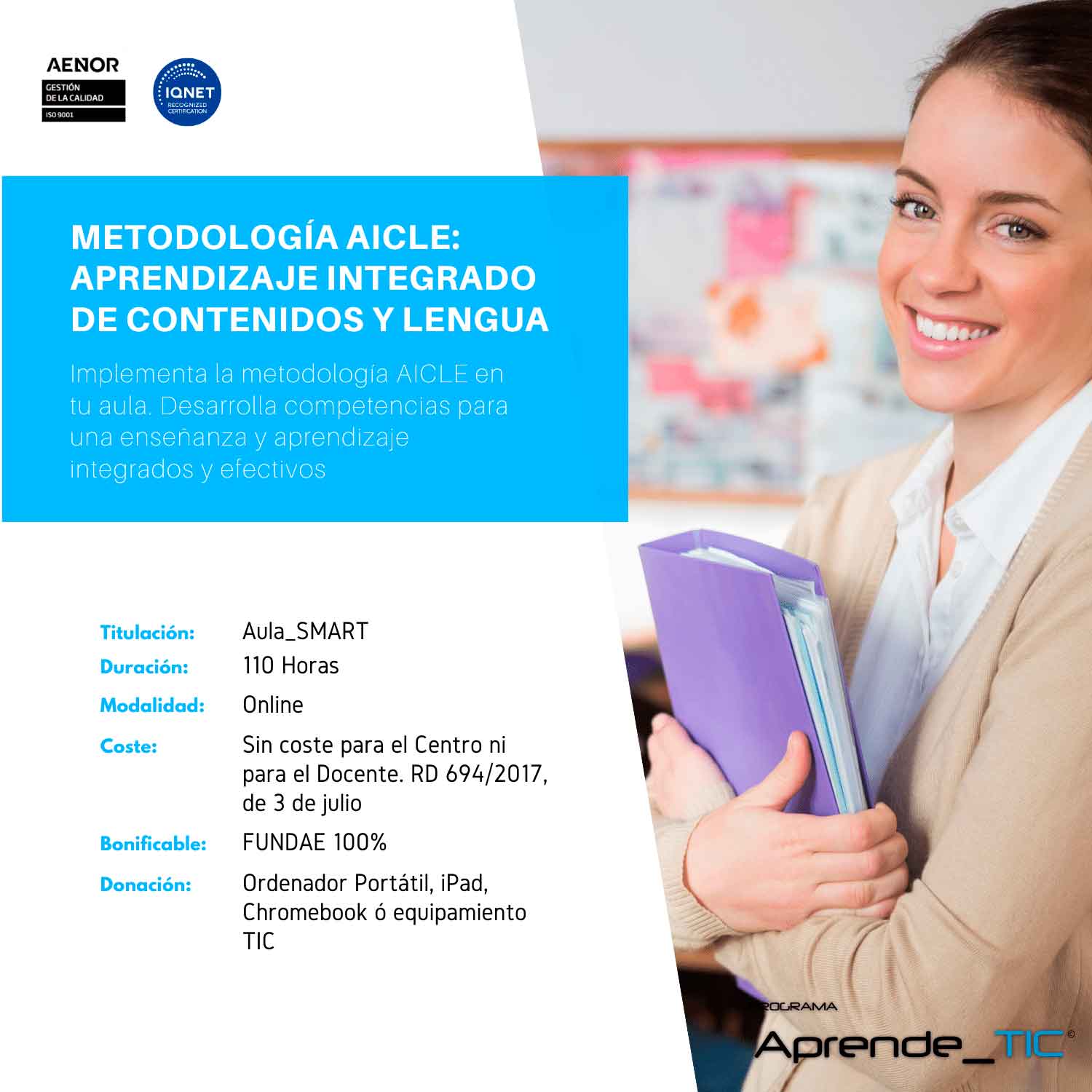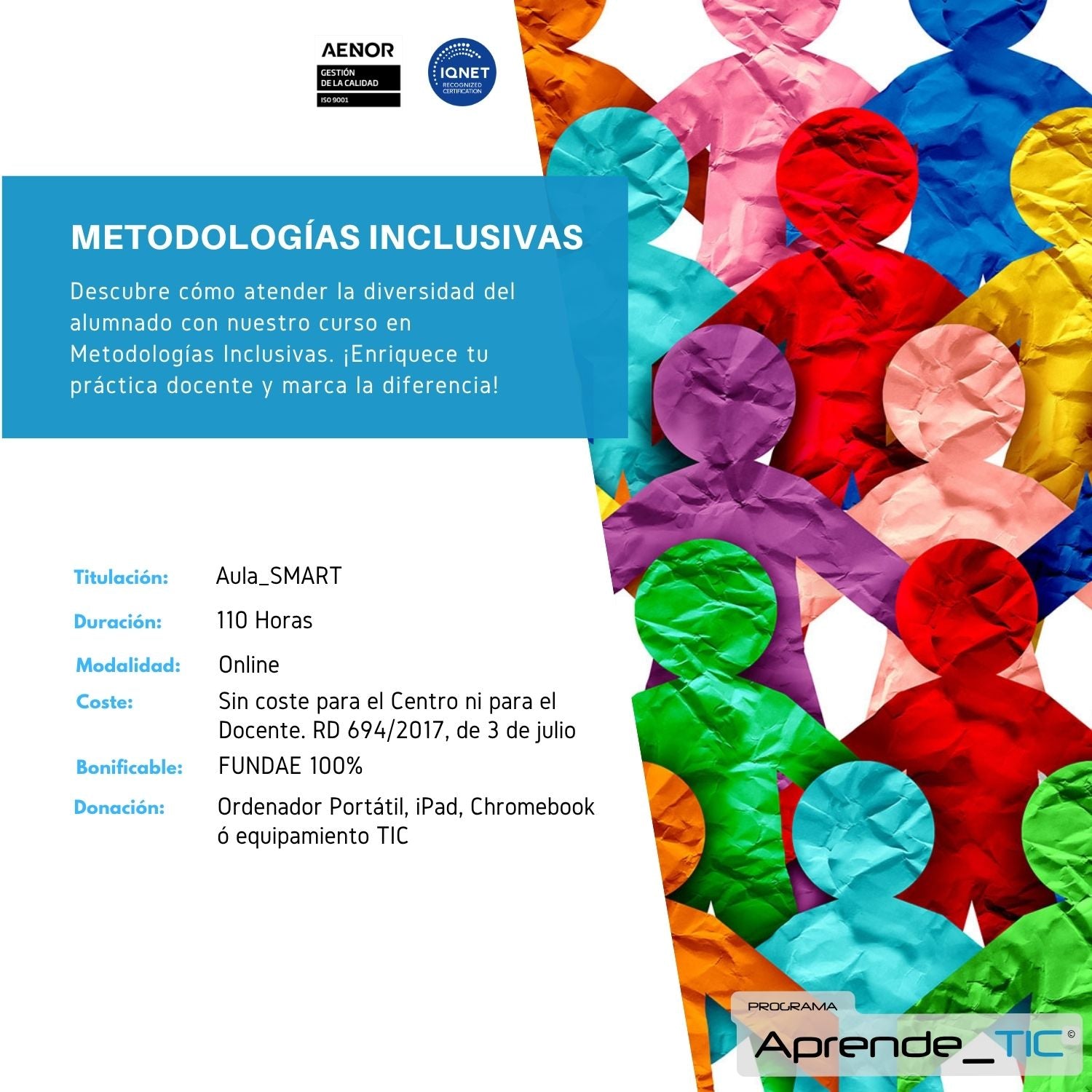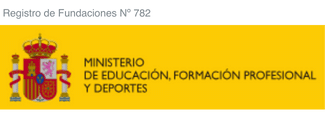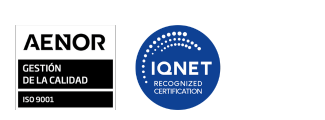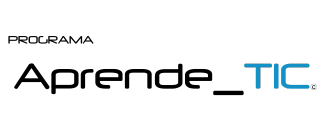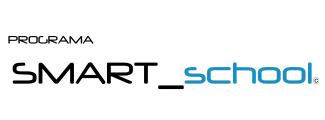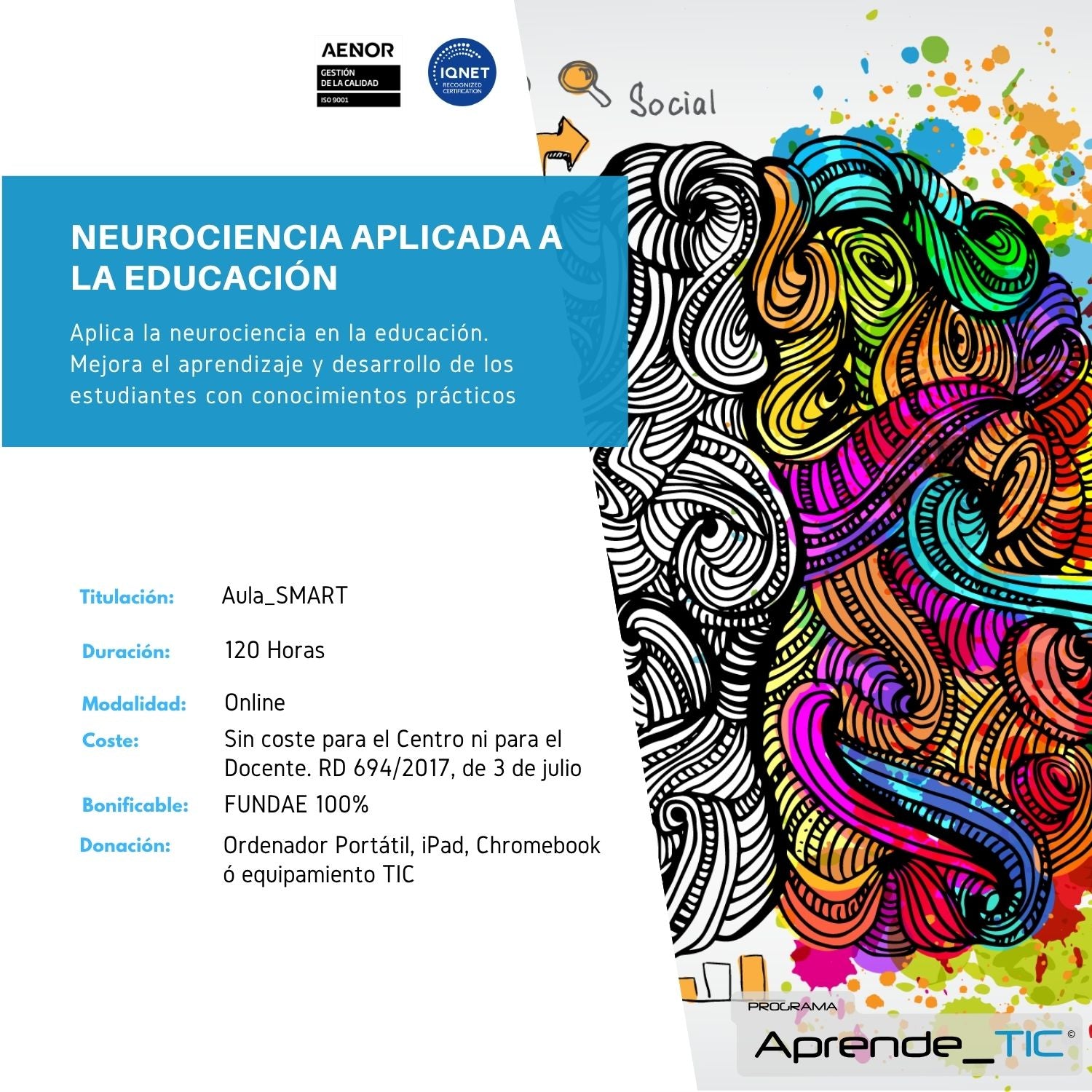
University Specialization Course in:
Neuroscience applied to education
Improve your teaching with the “Neuroscience applied to education” course! Learn how the brain works and apply this knowledge to optimize the learning of your students. Online course, 100% bonus and university degree. Sign up now and receive a free ICT team!
Free registration for the teacher and 100% bonus through Fundae for private and concerted centers, as long as you are in the General Social Security regime, RD 694/2017, of July 3. (Sign up through your center)
Course included in the AUGE_TIC AUGES PROGRAM. Every 100 hours of training, the Aula_Smart Foundation donates a laptop, iPad, Chromebook or other ICT equipment. (Valid for all teachers of private, concerted and public centers)
University degree obtained
Para la obtención del Título Universitario expedido por la Universidad de Vitoria-Gasteiz (EUNEIZ), es necesario realizar el abono correspondiente a los derechos de expedición una vez completado el curso.
A continuación, se detallan las tarifas según la duración del programa formativo:
Derechos de expedición:
- Cursos de 50 horas: 54,78 €
- Cursos de 100 horas: 83,38 €
- Cursos de 110 horas: 94,38 €
- Cursos de 120 horas: 94,38 €
Le agradecemos su compromiso con la formación continua y quedamos a su disposición para resolver cualquier consulta sobre el proceso de expedición.
Date start courses
All communities
- January 22, 2025 to March 19, 2025
- February 12, 2025 to April 9, 2025
- March 5, 2025 to May 5, 2025
- April 2, 2025 to May 26, 2025
- May 7, 2025 to July 1, 2025
- June 4, 2025 to July 29, 2025
- July 2, 2025 to August 7, 2025
Catalonia
- January 22, 2025 to April 16, 2025
- February 12, 2025 to May 12, 2025
- March 5, 2025 to May 30, 2025
- April 2, 2025 to June 20, 2025
- May 7, 2025 to July 29, 2025
Degree: University of Vitoria-Gasteiz Euneiz
Duration: 120 hours
Credits: 4 ECTS
Modality: Online
Place: Cabeula_interactive Campus
Cost: No cost to the center or the teacher. RD 694/2017, of July 3
Fundae: 100% bonus
FA_S donation: laptop, iPad, Chromebook or ICT equipment every 100 hours of training
Valid to score in the Baremo of Teaching Oppositions according to the R.D. 276/2007 of February 23 and for the scale corresponding to the state -level transfers contest, according to Royal Decree 1364/2010 of October 29.
(*) No cost to the center or the teacher according to RD 694/2017, of July 3.
(**) For students who are not going to take the course through their center

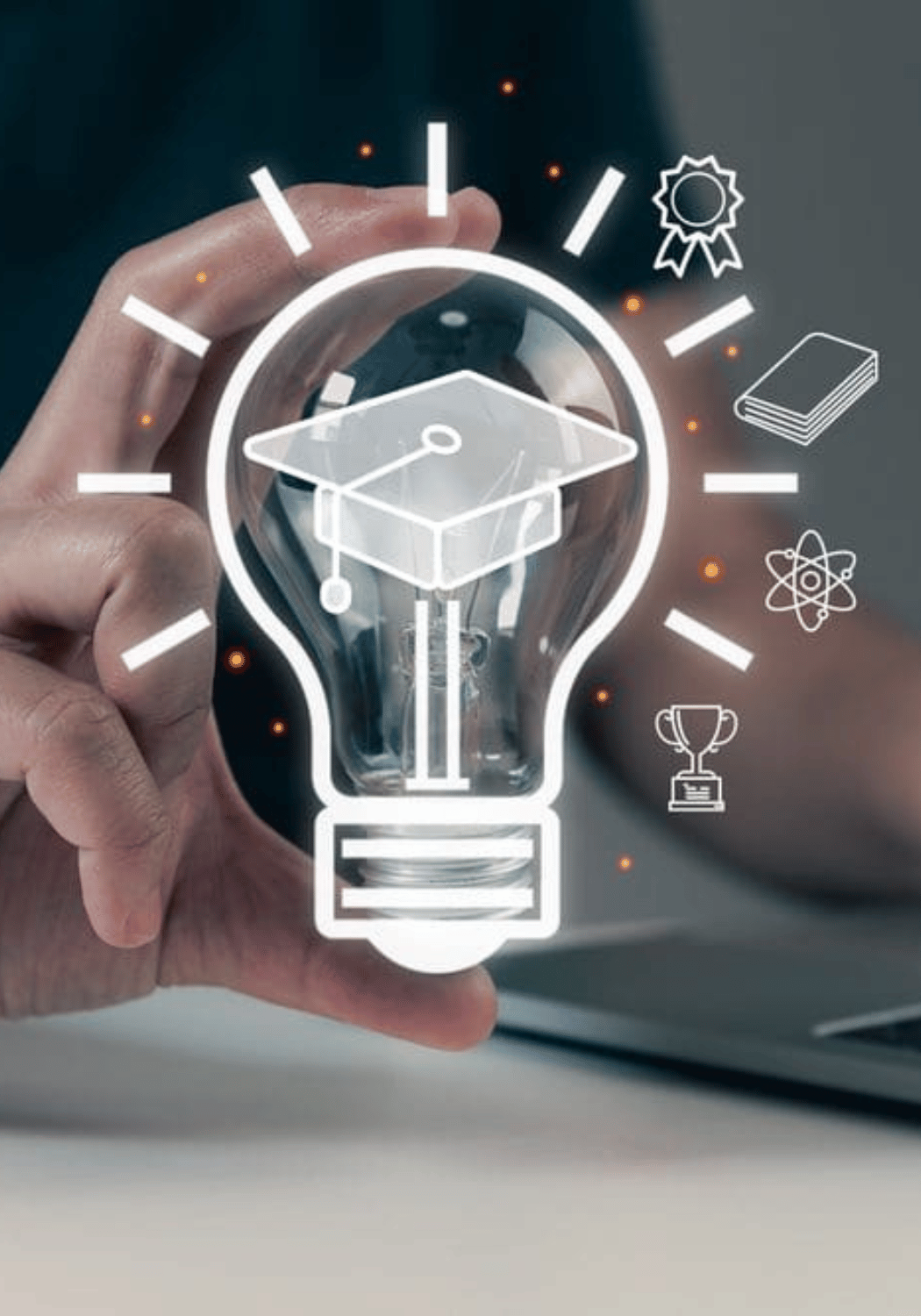
Neuroscience applied to education
Goals
The "University Course of Specialization in Neuroscience applied to Education" has as its main objective to provide participants with a deep understanding of the functioning of the brain and how this knowledge can be used to improve learning.
The course is divided into several modules, each with a specific objective:
Concepts of neuroscience, neuroeducation and neuromites: This module focuses on the definition and understanding of these key concepts in the field of educational neuroscience. Participants will learn to distinguish between facts and myths in neuroscience and how they apply to education.
Functioning of the human brain about learning: in this module, participants will acquire a deep knowledge of the functioning of the human brain and how it affects learning. The latest research in neuroscience and how these can be applied in the classroom will be explored.
Implementation in the educational programs of resources, appropriate measures and characteristics of neuroscience: This module teaches participants how to implement resources and measures based on neuroscience in educational programs. The objective is to help students with high capacities to fully develop their potential.
Contributions of neuroscience to autistic spectrum disorder: participants will know the latest advances in neuroscience in relation to autistic spectrum disorder. The implications of these advances for education and support to students with this disorder will be discussed.
Identification and analysis of the main influential emotions in the brain about learning: Participants will learn to identify and analyze emotions that have a greater impact on learning from a neuroscientific perspective. Strategies will be explored to manage these emotions in the classroom.
Neuroeducator concept and the main tools of neurotechnology: participants will familiarize themselves with the concept of neuroeducator and learn to use the main tools of neurotechnology in the educational field. It will be discussed how these tools can be used to improve the learning and performance of students.
In summary, this course prepares participants to apply the principles of neuroscience in the classroom, in order to improve the learning and development of students. Participants will leave the course with a solid understanding of neuroscience and how it can be applied in education, as well as practical tools that can start using immediately in their work.

Neuroscience applied to education
What prepares you
The "University Course of Specialization in Neuroscience applied to Education" can open various professional opportunities:
Teacher: The knowledge acquired in neuroscience can be applied in the classroom to improve learning processes.
School Counselor: Participants will be able to use their knowledge in neuroscience to detect and meet special educational needs.
Educational Consultant: Participants will be able to advise educational institutions in the implementation of teaching strategies based on neuroscience.
Researcher in Educational Neuroscience: Participants may continue their academic training and conduct research in the field of neuroscience applied to education.
Educational material developer: Participants will be able to design and develop educational materials that are based on principles of neuroscience.
Teaching trainer: Participants will be able to train other teachers in the use of teaching strategies based on neuroscience.
It is important to mention that professional outputs can vary depending on the previous training of the participant and the specific needs of the place where you want to work.

Neuroscience applied to education
Who is it addressed
The "University Course of Specialization in Neuroscience applied to Education" is aimed at:
Teachers: Teachers can benefit from neuroscience knowledge to improve their teaching strategies and better understand the needs of their students.
Psychologists: Psychology professionals can apply the principles of neuroscience to better understand students learning and development processes.
Education and health professionals: Those who work in disciplines related to education and health can find this course useful to improve their professional practice.
Graduates of Psychology and Education: Graduates in these disciplines can use this course to specialize and improve their career perspectives.
Psychology and Education Students: Students who are in the last semesters of these careers can benefit from this course to complement their academic training.
It is important to mention that this course can be especially useful for those who wish to work on the detection and intervention of special educational needs, as well as in the implementation of teaching strategies based on neuroscience.

Neuroscience applied to education
Methodology
The course methodology is based on 100%online learning, through the Aula_Smart virtual campus, an innovative and easy -to -use platform, which will allow you to access all the contents and resources of the course from anywhere and device. The course has a highly specialized teaching team, formed by education professionals with extensive experience and training in the analysis of teaching skills. They will accompany you and guide you throughout the learning process, through personalized tutorials, chat, email and even videoconference. The teaching method is totally multidisciplinary, since it combines different pedagogical approaches and strategies, such as:
- Theoretical contents, where the fundamental concepts and principles of the analysis of the teaching skills will be presented, as well as the normative and reference frameworks that regulate them.
- Practical contents, where theoretical knowledge will be applied to real or simulated cases of educational practice, using tools and methodologies to evaluate and develop teaching skills.
- Self -assessment activities, where you will reflect on the teaching performance itself and on the areas of strength and improvement, as well as on the strategies to enhance them.
- Collaborative learning activities, where the exchange of experiences, opinions and proposals through forums will be promoted.
In this way, the course methodology offers you dynamic, participatory and adapted training to your needs and interests, which prepares you to be a competent and effective teacher, capable of adapting to the demands and challenges of current education.
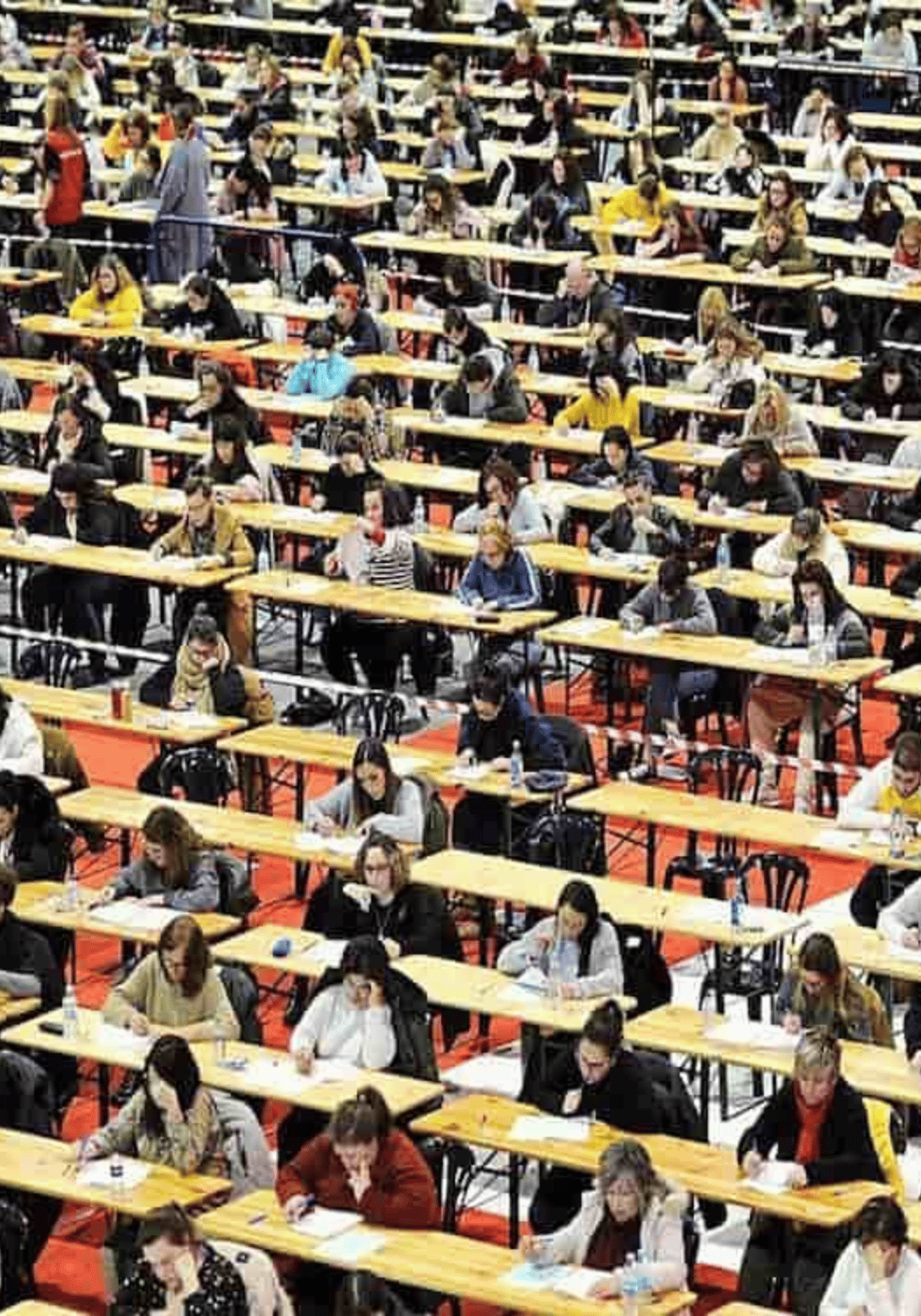
Neuroscience applied to education
Official character
Neuroscience applied to education
Syllabus
Download the agenda in .pdf format
Topic 1
1.1. Introduction
1.2. Neuroscience
1.2.1. Origin and evolution of neuroscience
1.3 Neuroeducation
1.4. Neuromites
1.4.1. Students learn better when they receive information through their dominant learning style: auditory, visual and kinesthetic
1.4.2. The human being only uses 10% of the brain
1.4.3. Hemispheres theory: left brain/ right brain
1.4.4. Learning conditioning up to three years of age
1.4.5. Cerebral gymnastics is based on neuroscience
1.5. Summary
Topic 2
2.1 Introduction
2.2 parts of the brain, its functions and properties
2.2.1 Central Nervous System (CNS)
2.2.2 Peripheral nervous system (SNP)
2.2.3 Functional areas of the cerebral cortex
2.2.5 Brain dominance
2.3 Attention, memory, learning in the brain, motivation and plasticity
2.3.1 Attention
2.3.2 The memory
2.3.3 Motivation
2.3.4 Cerebral plasticity
2.3.4.1 synaptic plasticity
2.4 Physical, psychological and environmental conditions of the brain that learns
2.4.1 Physical conditions
2.4.2 Psychological conditions
2.4.3 Environmental conditions
2.5 Learning and brain development in childhood, adolescence, adulthood
2.5.1 Development and learning in childhood
2.5.2 Development and learning in adolescence
2.5.3 Development and learning in adulthood
2.6 Summary
Topic 3
3.1 Introduction
3.2 Talent and High Capabilities
3.2.1 Definition of high capacities
3.2.2 High capacities and brain
3.2.3 Methodologies to work with high capacities
3.2.3.1 Curriculum enrichment
3.2.3.2 Cooperative work
3.2.3.3 Gamification
3.2.3.4 Rinons or extension workshops
3.3 high capacities, neuroscience and educational areas
3.3.1 Science Area
3.3.1.1 Proposals and resources for the Science Area
3.3.2 Language and Literature Area
3.3.2.1 Proposals and resources for the Language and Literature Area
3.3.3 Social and artistic area
3.3.3.1 Proposals and resources for the Social Area
3.3.3.2 Proposals and resources for the art area
3.4 Summary
Topic 4
4.1. introduction
4.2. Conceptualization of autistic spectrum disorder (ASD)
4.3. Contributions of neuroscience to autistic spectrum disorder
4.3.1 Neurogenetics
4.3.2. Brain variations related to ASD
4.3.3. Neuropsychology
4.3.4. Neuromites about tea
4.4. Mirror neurons theory
4.5 TEA: Neuroscience applied to education
4.5.1. Early Attention of the TEA from neuroscience
4.5.2. TEA learning process from neuroscience
4.6. Summary
Topic 5
5.1. Introduction
5.2. Emotions
5.2.1 The brain of emotions
5.2.2. Emotions: typology and functions
5.3. Neuroscience, emotions and learning
5.4. Neuroscience and emotional education
5.4.1 Theoretical foundation of emotional education
5.4.2. Objectives and principles of emotional education
5.4.3. Teaching process: Teacher
5.4.4. Emotional Intelligence and Emotional Education
5.5. Creativity
5.5.1. Conceptualization and contextualization of creativity
5.5.2. The creative and emotional brain
5.5.3. Stimulation of creativity in the classroom
5.6. Summary
Topic 6
6.1 Introduction
6.2 Neuroeducadores
6.3 New methodologies derived from technology
6.3.1 Gamification
6.3.2 Flipped Classroom
6.3.3 Connectivism
6.4 PROGRAMS AND APPLICATIONS
6.4.1 Attention
6.4.2 Visual, auditory, tactile and sensory integration skills to guarantee the quality of information entry into the brain
6.4.3 Motricity, balance and vestibular, side development and space-temporal sense to favor learning brain processes
6.4.4 Language and memory
6.4.5 Executive functions
6.4.6 Learning difficulties
6.4.6.1 dyslexia
6.4.6.2 Discalculia
6.4.6.3 Language difficulties
6.5 Robotics in Education
6.5.1 Programming and creativity
6.5.1.1 Robotics Learning
6.5.1.2 Programming tools
6.6 Summary
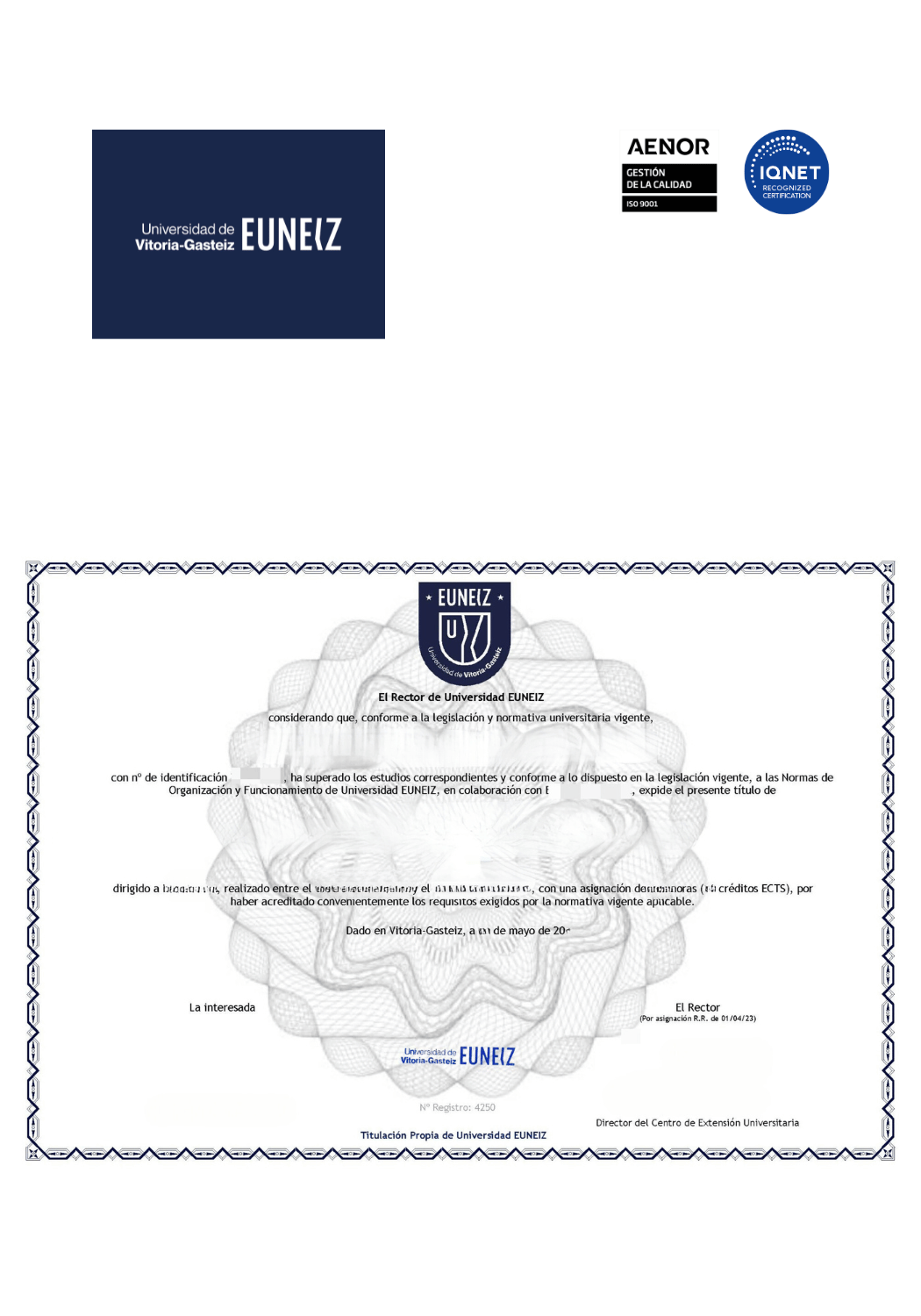
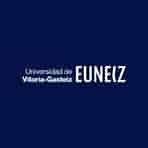
Neuroscience applied to education
Degree
Neuroscience applied to education
Do you have any questions about this course?
You can send us your consultation by filling out this form or in the following ways:
- Through the phone (+34) 951 411 800
- Through email
comunicacion@fundacionaulasmart.org
Related courses

Aula_SMart® Foundation
From the Aula_Smart® Foundation we work to develop and incorporate
New technologies to the education sector.
Contact us
Do you have any questions?
You can also send us your consultation in the following ways:
- Through the phone (+34) 951 411 800
- Through email
comunicacion@fundacionaulasmart.org
AULA_SMART ® Foundation
C/ Palma del Río, 19 - Melior Building, 29004, Málaga
Telephone: +34 951 411 800
E-mail: comunicacion@fundacionaulasmart.org
Website: www.fundacionaulasMart.org
